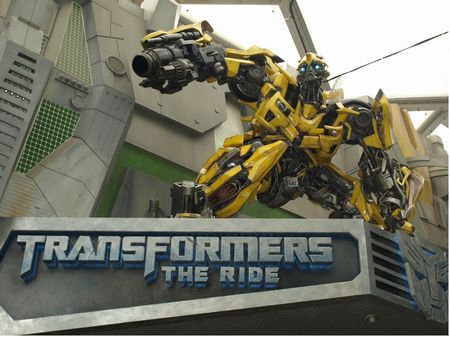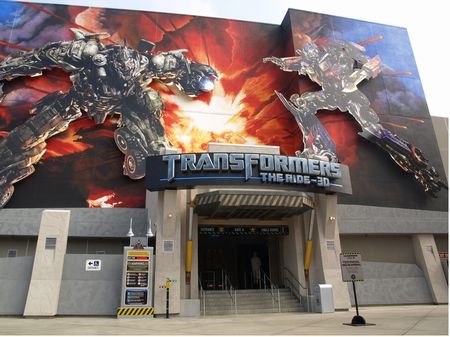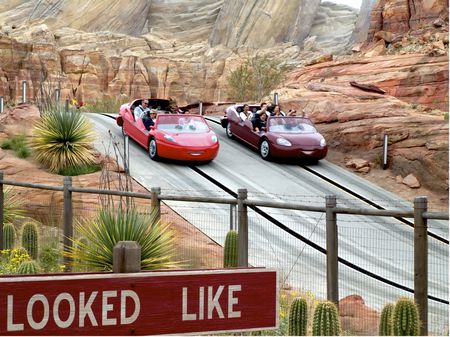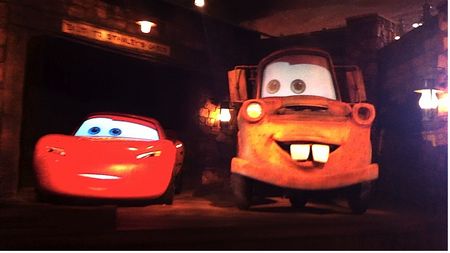
In journalism school, one of my professors assigned me to read Jon Franklin's book "Writing for Story." Franklin describes what he called the "conflict/resolution" model for storytelling, suggesting that all great stories - fiction or nonfiction - describe a conflict and the quest for a resolution. We see this most clearly in theme parks with that beloved cliche, "and something goes terribly wrong", whether that be dinos running wild through Jurassic Park or Imperial troops interrupting our Star Tours.
Universal Creative designer Thierry Coup told me last December that such conflict drive the narratives that captivate audience. "It has to [go wrong]. It gives us a chance to be heroes, and to try to save the day."

Universal's Transformers: The Ride embraces conflict from before we even board the ride. The evil Decepticons have found and attacked the NEST base we're visiting. They're after the Allspark that powers the Transformers, and it's up to us to help the good Autobot EVAC take it away to safety.

Unfortunately, "escape from the bad guys" is perhaps the hoariest cliche in theme park rides. I've lost count of the minimally decorated Six Flags roller coasters that use this conceit as their only acknowledgement of theme. It's especially weak when the ride upon which we're supposedly escaping unloads on the same platform where we board.
If attempted escape was all that Transformers: The Ride had offered, it likely wouldn't be resonating with visitors the way it is - winning our 2012 Theme Park Insider Award as the world's Best New Theme Park Attraction of the year. But Coup and his team at Universal Creative added a second conflict element to Transformers: The Ride, one that helped elevate the attraction to elite status.
After a wild romp through the battle between the Decepticons and Autobots, our host - EVAC - decides that he's had enough. When the Decepticon leader, Megatron, mocks us ("Cowards run. Heroes fight."), EVAC abandons our mission, breaks his orders and chooses to face Megatron instead. It's the classic "fight or flight" conflict, and as EVAC's passengers, we're in the middle of it. Thrust into battle as EVAC's accomplices, we resolve the second conflict by refusing the first. We refuse to escape and choose instead to fight back, defeating Megatron and returning to NEST as heroes.

While Transformers: The Ride relies on conflict to establish emotional stakes for its riders, Disney's Radiator Springs Racers takes the opposite approach. This might be the most emotionally comforting thrill ride ever created. It's the ride where nothing goes wrong. There's no substantial conflict here - just a good-natured race between cars at the end of the ride. But the ride's main characters, Lightning McQueen and Mater, reject the notion of that race as conflict by telling us as we leave that "everyone won" the race, "because we made friends."

Radiator Springs Racers' purpose is not to challenge us to become heroes, as on Transformers: The Ride. It's to reassure us - to provide a gentle, welcoming space where we can feel comfort and confidence making new friends. While Transformers ultimately makes us feel good by telling us we have within us the heroism to overcome life's challenges, Radiators Springs Racers makes us feel good by letting us spend a few moments in a life without challenges. It's the theme park equivalent of Mommy hugging us, telling us it's going to be all right, and setting up a playdate with a good friend.
And I love them both.
Together, Transformers: The Ride and Radiator Springs Racers illustrate the narrative range that theme park designers can inhabit in a mere few minutes of our time. Whether we want a complex, multi-level, conflict-drive narrative, or a character-driven experience that triggers our emotions, Universal's and Disney's designers have shown that theme parks can deliver an ever-widening variety of narrative experiences for their visitors.
Tweet
Cars Land is all about celebrating Route 66 and experiencing something that is so American and yet still exotic. On another note, look how many people love Nascar and racing and going fast. None of those have narratives but are still thrilling nonetheless.
On a last note, racing is a conflict. Granted, nothing is at stake. But the reality is when someone goes on a ride, they always know that nothing is ever really at stake. People ride Transformers to see them in action, to experience motion and stunning visuals. Who they are fighting and what they are fighting are not of consequence to most people.
It's kind of like why so many people love Main Street. It's engorssing, detialed, a tangible experience. But there is no conflict, so do that make it any less valid in the escapism of the theme park world?
The conflicts in the Cars movies are internal conflicts involving self exploration and growth. Anyone who has seen the movie has seen that conflict and knows that everyone in Radiator Springs is in a happy place. The idea is to visit that happy place. Any other conflict forced into the ride would have seem forced, out of nowhere and tacky. It doesn't need an external conflict.
The downside of constantly using the idea of something going wrong is perhaps getting a little redundant. With so many rides, it's become predictable.
Could it be that all this just shows that humans need conflict in our
lives to remain satisfied and feel like we have purpose...wait a minute that's way too deep for a theme park discussion haha
For Disney, nothing goes wrong on Radiator Springs Racers while our flight on Star Tours is interrupted when we must safely escort a Rebel Spy.
For Universal, *spoilers ahead*, our minion training on Despicable Me is cut short when we need to help Agnes get Gru's present back while on Transformers, Decepticons arrive to the headquarters to take the Allspark.
Overall, I believe with Disney, either something's already wrong or it isn't. Take the Tower of Terror for example. Walking towards it, you just have an eerie feeling that something's not right about this hotel. On board, nothing actually GOES wrong, it just is wrong and you're a part of it. Likewise, nothing goes wrong on Soarin because there's just no reason to.
On a more political note, where's Robert's usual 4th of July post? ;)
AND I love the comparison of Transformers and RSR on that tweet!
I actually feel sorry for people that HAVE to have conflict in their lives to feel "alive" but I won't get into the psychological reasoning for that. True, it's too deep of a discussion for here.
This article has been archived and is no longer accepting comments.